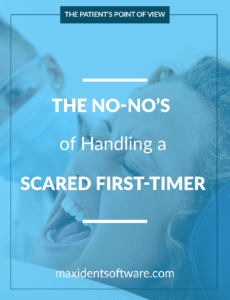
Join me on a path of patient discovery as I navigate the rough waters of regular patient issues and how they are not so regular from this side of the fence. Being on this side of the fence is a little tricky if you’re already an expert. Sure, you’ve been a patient before– new to the office, first time sitting in the chair, nervous and scared and looking at the dentist with wide eyes like, for all intents and purposes, your world might implode if they touch you with that needle they’re holding. But you’re an expert now. You know all the tools by name. You enter and leave that office daily. And you have all the technical know-how necessary to save or eliminate bad teeth. You might still be a patient and there might still be things you don’t like about seeing a Dental Professional, but there are now significant differences between your experiences and the experiences of your untrained patients.
The point of this series is to take you out of the driver’s seat for just a few minutes and help you understand what is really going on inside your patient’s head. Not only will this help you have a much better line of communication with your patients, but it will make it easier for you to empathize and educate in a way that will not alienate them. I understand if you want to duck out because you just don’t have time for this, but I assure you that taking a few minutes out of your day to get to know your patients on a more personal level will benefit you, your team and your practice in profound ways.
In this particular post, I want to focus on one of the most touchy subjects for us patients, fear. The first time I stepped into a dentist’s office, I felt my stomach drop, my heart race, and my mouth go dry. I felt sick and anxious and no matter what I did with my hands, I couldn’t stop them from shaking. I was 33. Fear is not biased, sexist or racist and it does not exclude based on age. It just is and you have to be prepared for anyone of any age, race, or sex to walk into your office who is just as terrified as I was. From your patient’s point of view, Here are just a few things you should avoid with scared first-timers.
Yelling
Here is what I tell everyone who attempts to yell the fear out of people. Don’t. Yelling only makes the fear exponentially worse and will lose you a valuable patient in the end. I was yelled at my first time and it was the worst feeling I’ve experienced. Not only did I feel small, I felt mortified. Here it was, my first time ever at a dentist’s office, and the dentist was yelling at me. Just like that, I was done. He was only redeemed when, at once, he apologized– a real sincere apology and he has never treated me like that since. It doesn’t take much to send someone racing for the door. And if you’re thinking right now that obviously a dental professional should not yell at their patients and you would never do that, just remember that even raising your voice is enough to constitute yelling. Frustration, anger, and impatience are instigators to this behaviour, so keep an eye on your attitude and measure your voice to make sure it is not rising to an unforgiving level. And if you do notice yourself straying, make it right by apologizing immediately.
Jargon
You are already intimidating enough to us. A first-time patient, terrified and stressed, is not going to be able to comprehend technical lingo, big words, or a scripted dissertation on their oral health issues. It’s just not going to happen. We’re too busy thinking about all those worst-case-scenarios swirling around inside our heads. This is why our first conversation with you is so pivotal to whether we stay with your practice or not. Make it a good one, not a long one. First, show you care about us as people before you go into a discussion about oral health. Let us feel comfortable enough to relax and talk to you. Maybe you can even attempt to discover the reason for our fear and help to soothe it. Just in case you’re wondering why we are looking at you with that oh-so-familiar blank expression on our faces, it isn’t because we’re stupid or slow, so try to avoid the eye rolling and furrowed brows. We’re scared. There is a difference. Fear paralyzes, so take it slow, take it easy, and provide us with the comfort we need to start trusting you.
Lecturing
I hate this. I mean HATE it. Doctors do this too and trust me, I have left many of them for just this reason. Giving a lecture is not going to gain you any points with your patients. Know why? It’s insulting, condescending and downright grueling to endure. I know you mean well. Honestly, you’re just trying to help and I understand that. But patients like me are not learning anything. We’re not even listening. We are too busy grinding our teeth and reconsidering our decision to come to you for help in the first place. Rethink your strategy here. Providing proper patient education does not need to start with a lecture. Let it start with a conversation.
Rushing
It has been my experience, unfortunately, that when doctors or dentists are attempting to rush me through a procedure or explanation, they have somewhere more important to be. And if this isn’t the case. Guess what? It is definitely what us patients are thinking. If you’re going to a fire directly after you treat us, let us know. We will understand; however, I do want to remind you that if you are not going to a fire, slow down. Please. We need to know we’re your number one priority and even if you insist that we are, going too fast tells us the exact opposite.
Pushing
This is all about your first impression, not as a qualified Dental Professional, but as a human being capable of empathy and compassion. Fears can be borne out of something as simple as a Dental Professional ignoring their protests and pushing forward with a terrifying procedure. This has to be one of the biggest no-no’s not only because ignoring your scared patient’s protests will result in the loss of that patient, but also because you may have consequently damaged any chance of that patient trusting any Dental Professional ever again, which will in turn cause their own oral health to suffer.
Conclusion
Everyone is different. I have to stress this point as I am just one person with experiences much different than others, sharing my individualized opinion. But even though everyone is different, we are all human and we expect and deserve to be treated with respect, patience, and empathy. Dig deep.
Do you remember your first dental visit? How did you feel? Did your Dental Professional do or say something that inspired you? Or did they do or say something that you vowed to never do or say? Let us know your first-time experiences in the comments below. And keep your eyes open for my next “The Patient’s Point-of-View” blog post, regarding a very controversial way to handle negative reviews.



